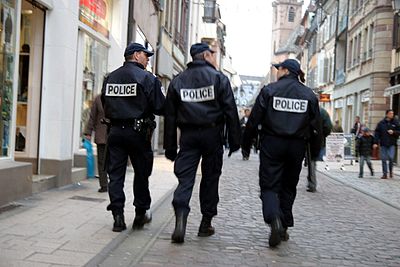
Crime in France is combated by a range of French law enforcement agencies.

Crime in France is combated by a range of French law enforcement agencies.
Though France's homicide rate fluctuated substantially in recent years, it tended to decrease through 2000 - 2014 period ending at 1.2 cases per 100,000 population in 2014. [1]
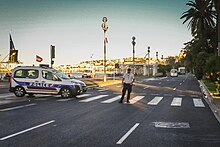
Many terrorist attacks have occurred in France, especially from the mid-1970s onwards. These include the 1995 France bombings, January 2015 Ile-de-France attacks, the November 2015 Paris attacks, the 2016 Magnanville stabbing, the 2016 Nice truck attack, the 2016 Normandy church attack, and the 2018 Paris knife attack. These attacks have been one of the reasons for the homicide rate fluctuation after 2014.
In September 2018, a police chief was stabbed to death in the city of Rodez. "The attacker was known to police. He had defaced the city hall door on 11 April," said Christian Teyssèdre, the Mayor of Rodez. [2]
On 31 August 2019, a 19-year-old man was stabbed to death and eight others wounded, in Villeurbanne, Lyon. Two men, armed with a knife and a skewer, carried out the attack. [3]
On 29 October 2020, Mayor Christian Estrosi said that 3 people were killed and several more were wounded in a suspected terror attack inside the Notre Dame Basilica church in the French city of Nice. Officials claim that this was a terror attack. [4]
In 1971, the rape rate stood at 2.0 per 100,000 people. [5] While in 1995, it was 12.5. [6] In 2009, it stood at 16.2. [7] According to a 2012 report, about 75,000 rapes take place each year. [8]
According to a 2014 article, about 5,000 to 7,000 of the rapes are gang rapes. [9]
Le Milieu is a category of organized crime in France. Criminal groups associated with the Milieu work in every major city in France, but are mostly concentrated in Marseille, Grenoble, Paris, and Lyon. [10]
In 2011, Transparency International concluded in its annual report for 2011 that France does not do enough to stop corruption. [11] A TNS Sofres poll in October 2011 indicated that 72% of the French public had the perception that politicians are corrupt. [12]
In August 2012, the French Government announced the creation of fifteen "Priority Security Zones"' in an effort to target crime hotspots. Extra police, riot police, detectives and members of the intelligence services are to be mobilised. Social services, educational bodies and charities also put extra resources into the selected areas.
The Neuhof area of Strasbourg was selected because of a need to tackle violent crime, and the historic rural town of Chambly to the north of Paris is being focused on because of rising burglary rates and car theft. The northern quarter of Amiens in the Somme region and areas of Seine-Saint-Denis to the north of Paris, which witnessed fierce rioting in 2005, are priority zones because of widespread drug dealing and a rampant black market. [13]
Violent crime is relatively uncommon in the city centre. Pickpockets are the most significant problem and are commonly children under the age of 16 because they are difficult to prosecute. Pickpockets are very active on the rail link from Charles de Gaulle Airport to the city centre.
The Paris Police Prefecture publishes a pamphlet entitled "Paris in Complete Safety" that provides practical advice and useful telephone numbers for visitors. In an emergency, dialling 17 will connect the caller to the police. You can also dial the Europe-wide emergency response number 112 to reach an operator for any kind of emergency service (similar to the U.S. and Canadian 911 system). Non-French speakers may experience a delay while an English speaker is located.

Crime in Sweden is defined by the Swedish Penal Code and in other Swedish laws and statutory instruments.
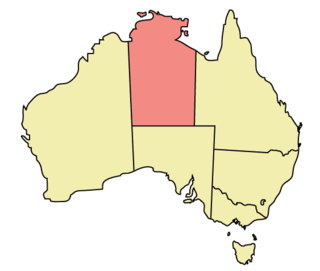
Crime in the Northern Territory is managed by the Northern Territory Police, the territory government's Department of the Attorney-General and Justice and Territory Families.
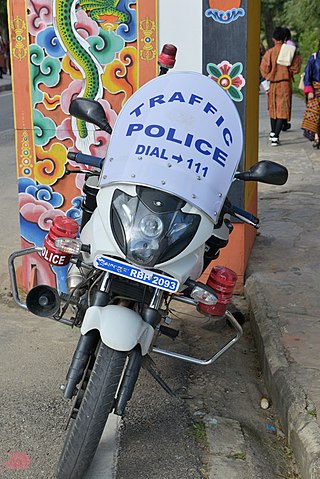
Bhutan has a low crime rate. Incidents of petty crime are occasionally reported in the country. Violent crime is very uncommon. Some cases of drug abuse are reported; alcohol abuse is a problem. But in general, drug trafficking is low. The most serious threat to Bhutan's security is terrorism by different terrorist groups from neighboring countries illegally camped in the nation.

Figures on crime in London are based primarily on two sets of statistics: the Crime Survey for England and Wales (CSEW) and police recorded crime data. Greater London is generally served by three police forces; the Metropolitan Police which is responsible for policing the vast majority of the capital, the City of London Police which is responsible for The Square Mile of the City of London and the British Transport Police, which polices the national rail network and the London Underground. A fourth police force in London, the Ministry of Defence Police, do not generally become involved with policing the general public. London also has a number of small constabularies for policing parks. Within the Home Office crime statistic publications, Greater London is referred to as the London Region.
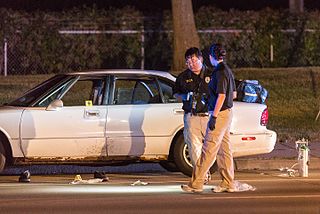
Crime in Minnesota encompasses a wide range of unlawful activities that occur within the state, regulated by both state and federal laws. While crime rates in Minnesota are generally below the national average, certain areas and types of crime have garnered public attention.
The 2011 Tel Aviv nightclub attack was a combined vehicular assault and stabbing attack carried out at 01:40 (GMT+2) 29 August 2011 in which a Palestinian attacker stole an Israeli taxi cab and rammed it into a police checkpoint guarding the popular nightclub, Haoman 17, in Tel Aviv which was filled with 2,000 Israeli teenagers. After crashing into the checkpoint, the attacker jumped out of the vehicle and began stabbing people. Four civilians, four police officers, and also perpetrator were injured in the attack. The perpetrator was living illegally in Israel at the time of the attack.

The Tandragee killings took place in the early hours of Saturday 19 February 2000 on an isolated country road outside Tandragee, County Armagh, Northern Ireland. Two young Protestant men, Andrew Robb and David McIlwaine, were beaten and repeatedly stabbed to death in what was part of a Loyalist feud between the Ulster Volunteer Force (UVF) and their rivals, the breakaway Loyalist Volunteer Force (LVF). The men were not members of any loyalist paramilitary organisation. It later emerged in court hearings that Robb had made disparaging remarks about the killing of UVF Mid-Ulster Brigade leader Richard Jameson by an LVF gunman the previous month. This had angered the killers, themselves members of the Mid-Ulster UVF, and in retaliation they had lured the two men to the remote lane on the outskirts of town, where they killed and mutilated them.

A stab wound is a specific form of penetrating trauma to the skin that results from a knife or a similar pointed object. While stab wounds are typically known to be caused by knives, they can also occur from a variety of implements, including broken bottles and ice picks. Most stabbings occur because of intentional violence or through self-infliction. The treatment is dependent on many different variables such as the anatomical location and the severity of the injury. Even though stab wounds are inflicted at a much greater rate than gunshot wounds, they account for less than 10% of all penetrating trauma deaths.
Kristine Luken was an American Christian who was murdered in a Palestinian terrorist attack on December 18, 2010, while hiking with her friend Kay Wilson in the hills of Jerusalem. Despite multiple stab wounds, Wilson survived the attack; Luken's body was later found by Israeli police, bound and stabbed to death. The Palestinian terror cell that perpetrated the attack were later arrested. During the investigation, the cell members also confessed to the murder of Neta Sorek, whose stabbed body had been found earlier that year near the Beit Jimal Monastery in the Judean Hills. The Palestinian terrorists were convicted of a series of violent crimes.
On the afternoon of 25 May 2013, French soldier Cédric Cordier was attacked and stabbed in the Paris suburb of La Défense by a man who was later ruled by a court not to be criminally responsible for psychiatric reasons.

Crime in Hong Kong is present in various forms. The most common crimes are thefts, assaults, vandalism, burglaries, drug offenses, sex trafficking, and triad-related crimes.
Crimes may be committed both against and by immigrants in Germany. Crimes involving foreigners have been a longstanding theme in public debates in Germany. In November 2015, a report that was released by the Federal Criminal Police (BKA) stated that "While the number of refugees is rising very dynamically, the development of crime does not increase to the same extent." Interior Minister Thomas de Maizière (CDU) noted that "refugees are on average as little or often delinquent as comparison groups of the local population." A 2018 statistical study by researchers at the University of Magdeburg using 2009-2015 data argued that, where analysis is restricted to crimes involving at least one German victim and one refugee suspect and crimes by immigrants against other immigrants are excluded, there is no relationship between the scale of refugee inflow and the crime rate. In 2018 the interior ministry under Horst Seehofer (CSU) published, for the first time, an analysis of the Federal Police Statistic, which includes all those who came via the asylum system to Germany. The report found that the immigrant group, which makes up about 2% of the overall population, contains 8.5% of all suspects, after violations against Germany's alien law are excluded.
Spencer Stone, a United States Air Force staff sergeant, was stabbed on October 8, 2015, in downtown Sacramento, California. Stone was stabbed by a 28-year-old California man, James Tran. The event received considerable attention in the U.S., in part because Stone had helped stop a gunman on a Paris-bound train traveling from Amsterdam via Brussels two months earlier in August 2015.

ISIL-related terrorist attacks in France refers to the terrorist activity of the Islamic State in France, including attacks committed by Islamic State-inspired lone wolves. The French military operation Opération Sentinelle has been ongoing in France since the January 2015 Île-de-France attacks.
On 3 February 2015, three soldiers, guarding a Jewish community center in Nice, France, were attacked with a knife by Moussa Coulibaly, a lone-wolf terrorist.

On 12 May 2018, a 20-year-old Chechnya-born French citizen, armed with a knife, killed one pedestrian and injured four others near the Palais Garnier opera house in Paris, France, before being fatally shot by police. The stabbings were in the area of Rue Saint-Augustin and Passage Choiseul. French President Emmanuel Macron said France had "paid once again the price of blood but will not cede an inch to the enemies of freedom." The suspect, identified as Khamzat Azimov, had been on a counter-terrorism watchlist since 2016. Amaq News Agency posted a video of a hooded person pledging allegiance to Islamic State of Iraq and the Levant (ISIL) leader Abu Bakr al-Baghdadi, claimed to be the attacker. Europol classified the attack as jihadist terrorism.
A mass stabbing is a single incident in which multiple victims are harmed or killed in a knife-enabled crime. In such attacks, sharp objects are thrust at the victim, piercing through the skin and harming the victim. Examples of sharp instruments used in mass stabbings may include kitchen knives, utility knives, sheath knives, scissors, katanas, hammers, screwdrivers, icepicks, bayonets, axes, machetes and glass bottles. Knife crime poses security threats to many countries around the world.
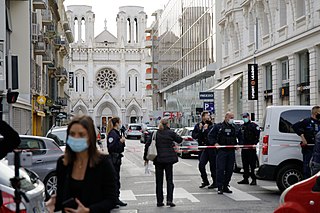
On the morning of 29 October 2020, three people were killed in a stabbing attack at Notre-Dame de Nice, a Roman Catholic basilica in Nice, France. The alleged attacker, Tunisian man Brahim Aouissaoui, was shot by the police and taken into custody. Both French President Emmanuel Macron and the mayor of Nice, Christian Estrosi, said it was a terrorist attack attributed to Islamic extremism.